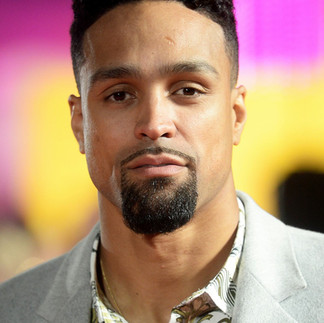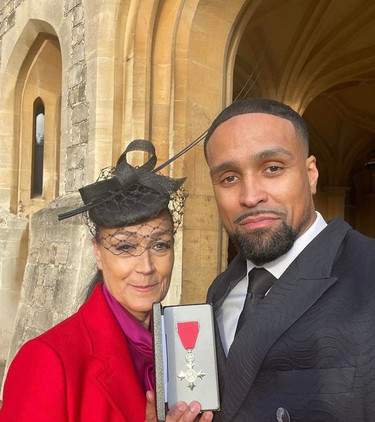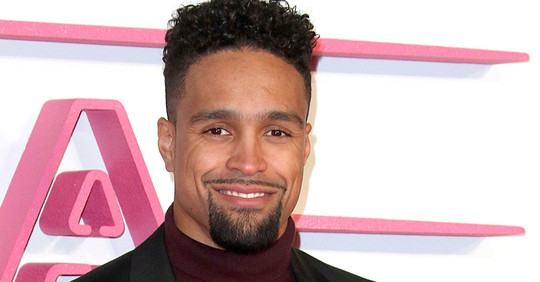May 12th: Today’s Feature
- webbworks333
- May 11, 2025
- 4 min read
May
Ashley Modurotolu Banjo MBE (born 4 October 1988) is an English street dancer, choreographer, actor and television presenter. He is the leader of dance troupe Diversity who won the third series of Britain's Got Talent in 2009. Banjo was a judge on the Sky1 talent show Got to Dance and co-presenter of the Saturday night BBC game show Can't Touch This. Since 2018, he has been a judge on Dancing on Ice.
Ashley replaced Simon Cowell, who was recovering from an electric motorcycle accident, as a judge on the ITV show Britain's Got Talent in September and October 2020 during the live-shows as well as during the 2020 Christmas special.
Early Life and Education
Ashley, the son of former heavyweight boxer Funso Banjo and Danielle, received his education at the prestigious St John's School in Billericay. During his time at the school, he excelled academically and was appointed as Head Boy. Additionally, Ashley showcased his athletic abilities by setting the high jump sports day record, a testament to his talent in sports.
Diversity
In 2007, Ashley and his younger brother Jordan co-founded Swift Moves along with nine of their friends, eventually rebranding the group as Diversity. Within their first year of formation, Diversity achieved success by emerging victorious in the Street Dance Weekend 2007 competition. This triumph paved the way for their decision to participate in the renowned television show Britain's Got Talent, where they captivated audiences with their unique dance performances and earned widespread acclaim. Ashley, known by the moniker "Chosen" among his fellow Diversity members, played a pivotal role in the group's journey to fame and success.
Success
Diversity, received unanimous "yes" votes from all three judges during their audition, which propelled them to compete in the first semi-final on 24 May. Although they narrowly missed out on securing the public vote-decided first place, losing to the talented Susan Boyle, they managed to win the judges' vote against Natalie Okri. Undeterred, Diversity persevered and advanced to the final, which took place six days later. In a thrilling turn of events, they were ultimately crowned as the winners, surpassing both Boyle and Julian Smith, who secured second and third place respectively. As a testament to their victory, Diversity was awarded a substantial prize of £100,000, equivalent to approximately £9,090 per member. Their triumph also granted them the incredible opportunity to showcase their talent before Queen Elizabeth at the prestigious Royal Variety Show on 7 December 2009.
Following their remarkable success, Ashley Banjo, co-founder & prominent member of Diversity, continued to flourish within the entertainment industry. He embarked on a lucrative and highly esteemed career in television and acting, solidifying his status as a prominent figure. Notably, since January 2018, Banjo has assumed the role of a judge on the popular show Dancing on Ice, commencing with its tenth series. This new venture further propelled his already thriving career, allowing him to share his expertise and contribute to the success of aspiring performers. Banjo's involvement in the show undoubtedly adds a valuable perspective and enriches the overall experience for both the contestants and the audience alike.
Racism and Justice
Ashley Banjo disclosed that his father was concerned about him speaking out on George Floyd's death, fearing it could impact his career in the industry.
The Dancing On Ice judge took to social media two days after Floyd's death, describing the incident as one of the most disturbing things he had ever witnessed.
Following Ashley's public statements and call for change, his father, Funso Banjo, a former heavyweight boxer, reached out to him expressing his worries. Recalling his father's reaction to his initial post, Ashley revealed that his father's cautious nature and lifelong experience with racism deeply affected him. His father expressed concern for Ashley's actions, highlighting how deeply ingrained acceptance has become for him. This concern extended to Ashley's career, which saddened him. Ashley questioned why his father worried about him speaking the truth rather than saying something controversial. However, he was grateful that this concern was global and eventually sparked a movement.
In raising his own children, Ashley believes it is crucial to teach them about justice from an early age. He wants to instil in them the importance of standing up against injustice and calling it out as wrong. This commitment to teaching his children about justice reflects Ashley's personal experiences and his desire to create a more inclusive society.
Ashley faced arrest, interrogation, and various challenges. He once joked that going through a month at school without experiencing racism would have been unusual.
He attended a small school where he was the only black student in his year and racism was a prevalent issue during his upbringing. Ashley's encounters with racism were unfortunately a common occurrence throughout his childhood.
He also faced racial profiling from a young age, regularly being pulled over by the police simply for driving nice cars. Racism was a constant presence in his life, starting from his school days. These experiences have shaped his perspective and fuelled his determination to fight against racism and promote equality.
Legacy & Honours
Much celebrated dancer and choreographer, Ashley, has expressed his gratitude and pride upon being appointed an MBE, describing it as "the ultimate accolade". He was humbled and proud, never expecting such an honour and that it meant the world to him for his parents to witness this moment. This recognition highlights his significant contributions to the arts and his impact on the cultural landscape.
In June 2021, Ashley Banjo took on the role of fronting an ITV documentary that delved into his personal history and the civil rights movement in the UK. Additionally, he spoke out against the racist abuse faced by England's black footballers after their loss in the Euros final. Banjo's willingness to engage in important conversations and address social issues demonstrates his commitment to using his platform for positive change and advocacy.
As the choreographer for Diversity, Ashley Banjo has been instrumental in pushing the boundaries of dance and creativity. He has created numerous performances for the group, including those featured in their successful UK tours. Banjo's talent and charisma continue to inspire audiences worldwide, and his dedication to authenticity and standing up for his beliefs serve as a powerful example for others to follow. His impact on the dance industry and his advocacy for social justice make him a highly respected and well beloved figure in both the arts and activism.


































